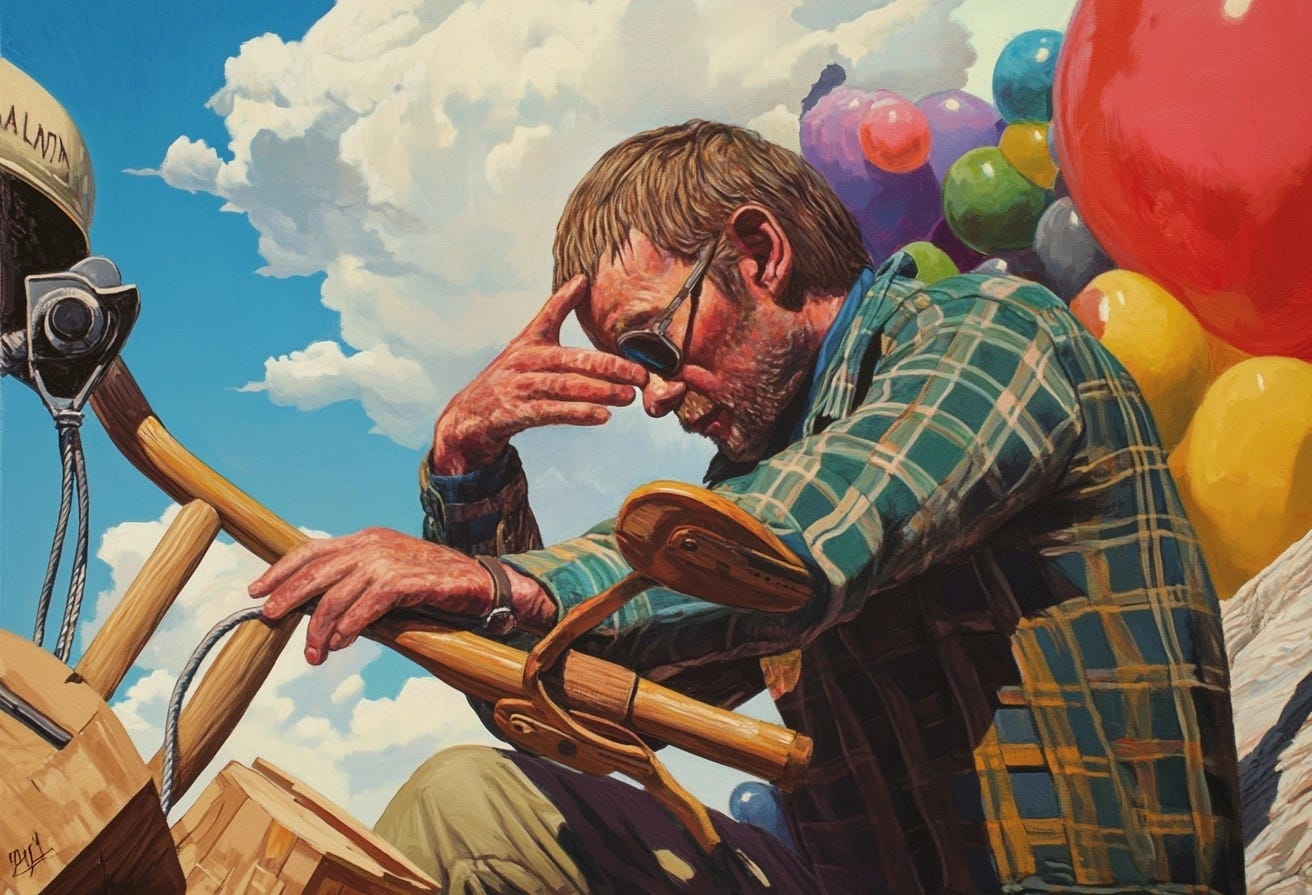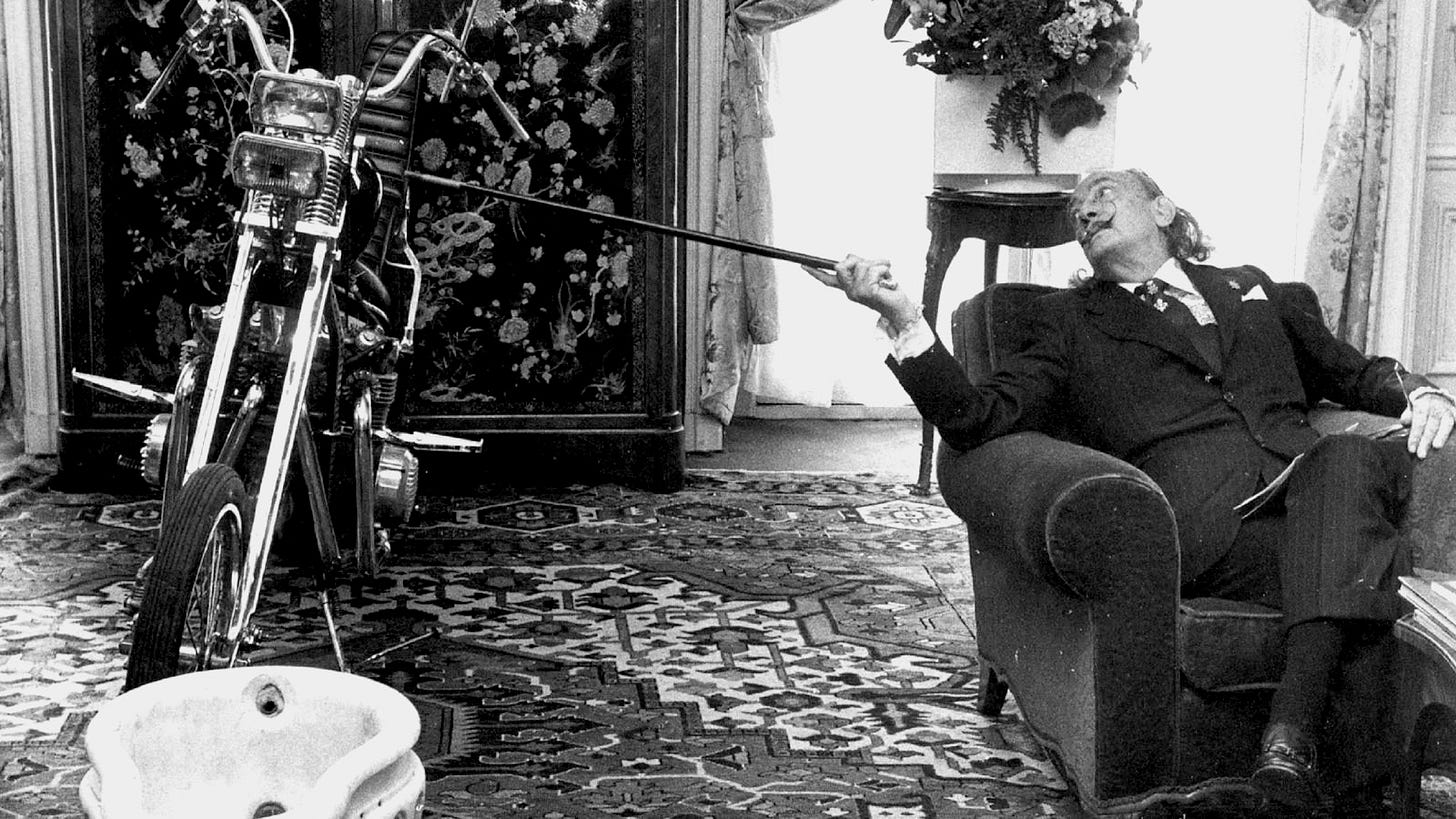I uttered a loud cry. I had just that instant discovered the morphological secret of Freud!
Freud’s cranium is a snail! His brain is in the form of a spiral—to be extracted with a
needle!—Salvador Dalí The CIA…is behind this Irish-Cartel hookup.—Jackson "Jax" TellerSalvador Dalí’s famed paranoiac-critical method rests on texts like Freud’s The Interpretation of Dreams from 1900. The neurologist-writer would meet Dalí in 1938, a year before the former figure’s death at the onset of the Second World War, and forty years before the publication of Rem Koolhaas’s Delirious New York, in which the method in question’s explained with light trace of the book's Cold War context:
Paranoid-Critical activity is the fabrication of evidence for improvable speculations and
the subsequent grafting of this evidence on the world, so that a “false” fact takes its
unlawful place among the “real” facts. These false facts relate to the real world as spies
to a given society: the more conventional and un-noted their existence, the better they
can devote themselves to that society’s destruction. Thirty years later, Sons of Anarchy starts, running from 2008 to 2014. While SoA was in its time self-branded as a kind of (The) Sopranos with motorbikes (Drea de Matteo features), it was more directly a riff on Hamlet but with motorbikes: the protagonist Jackson “Jax” Teller is based on Prince Hamlet, his father John Teller the Ghost, Gertrude is his mother Gemma Teller Morrow, and King Claudius is Clarence “Clay” Morrow. Hamlet features in Freud’s The Interpretation of Dreams and in many subsequent discussions of the Oedipus complex, and so it should not be surprising that Sons of Anarchy was composed by the paranoiac-critical method; a double-visioned, hallucinatory misreading of reality’s empirical fabric.
The quote above by Jackson "Jax" Teller—Vice President and later President of the Sons of Anarchy Motorcycle Club Redwood Original (SAMCRO)—reveals a major twist of the show: the Mexican drug cartel that the boutique Californian motorcycle club was working with to sell weapons to “the IRA” (more than ten years after the Good Friday Agreement) is in fact CIA-infiltrated. A motorcycle club with less than 20 real members is however of major significance to the CIA in the paranoiac SoA universe, as in Sons of Anarchy, the President of the Sons of Anarchy Motorcycle Club Redwood Original has more power than the President of the United States of America. No wild application of the Unitary Executive Theory would ever bridge the gap of authority between each of these Presidential roles. The President of SAMCRO does not however have any power compared to the leaders of the Continuity Irish Republican Army. In reality, the CIRA has had as many as 50 members in the 21st Century. In Sons of Anarchy, the continuity IRA of the 2000s and 2010s has far more power than the President of the United States of America, let alone the Taoiseach nor the British Prime Minister (the show features 0% Irish casting). SoA is also set in a kind of geographical Möbius strip in which the west coast of the US is quickly accessible to Ireland via miniature speedboat.
While selling weapons with, for, or, to the cartels, the IRA, the US government etc., the motorcycle club members maintain an intellectual interest in anarchism beyond the name of their club. Jax and his dead father draw their ethos from an Emma Goldman quote graffitied under a bridge; an anarchist who arrived in America in 1885, the year that Gottlieb Daimler and Wilhelm Maybach made the first petroleum-fueled internal combustion motorbike, the ‘Daimler Reitwagen’; the year too that Freud married Martha Bernays. Other characters like Otto Delaney listen to audiobooks on Prince Kropotkin in his prison library. Throughout the course of the show, he is blinded in both eyes and bites off his own tongue. His wife is a pornstar who is murdered by Tom Arnold, the man who played the father, Stanley Stupid, in the 1996 film, The Stupids. Unlike any recent rendition of Hamlet, the Sons of Anarchy also stars Marilyn Manson as a queer prison Nazi, a character who slouches towards the vulgar Derridean mess of contemporary rightwing gays and bored three-headed cows.
What’s the relevance of the Sons of Anarchy to today? Beyond various reboot speculations, the show is highly germane to contemporary recalibrations of the American, and global, conditions of production and trade: ‘The Sons’ as they’re refered achieve in their fictional town of ‘Charming’ the most successful counter-globalisation political economy ever experienced on earth, and this is why both Naomi Klein and Tucker Carlson are honorary members of the MC. In Season 1, an agent of the Bureau of Alcohol, Tobacco, Firearms and Explosives (ATF)—later executed without consequence—comments to a police officer that it’s strange there’s no Starbucks in Charming. The fact that the town’s ruling political junta, The Sons, have served for decades as a bulwark against neoliberal globalisation is made explicit many times in dialogue. The show’s writers (channeling Buchanan, Nader, Klein and Carlson) applied the paranoiac-critical method to cracking the nut of the 21st century corporate hellscape; the tool to crack this nut was a motorbike. The only business that exists in the town of Charming, a place of tens of thousands, is the garage run by the motorcycle club. The economy of this garage, subsidized by IRA-Cartel-CIA financialization, produces a ubiquitous middle class despite 99.8% unemployment; i.e. a successful Kropotkinite anarcho-communism. The poorest person in the town is the police chief, who lives in a Winnebago, assumedly as a lifestyle choice. There’s no white trash in Charming: the outlaw motorcyclists of Sons of Anarchy look uniformly like ageing alternative rockers; Dave Navarro of Janes Addiction also features, as does Henry Rollins.
Hopefully additional sequel, prequel, and parallel series will be made.
Oh, Jackson. You just killed an IRA king. There's no comin' back from that, lad.






Just need to somehow weave in 2023’s impotent dramatisation of Danny Lyon’s The Bikeriders and maybe some Sonny Barger anecdotes and this is a full dissection of the American dream, for me, at least.